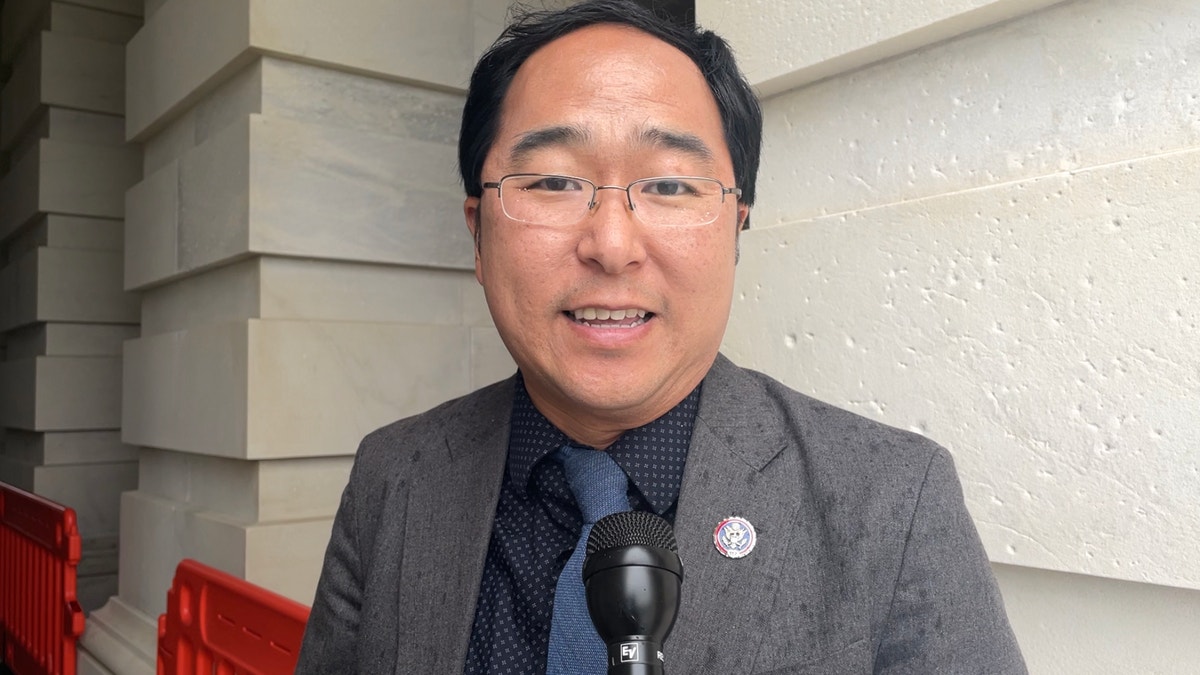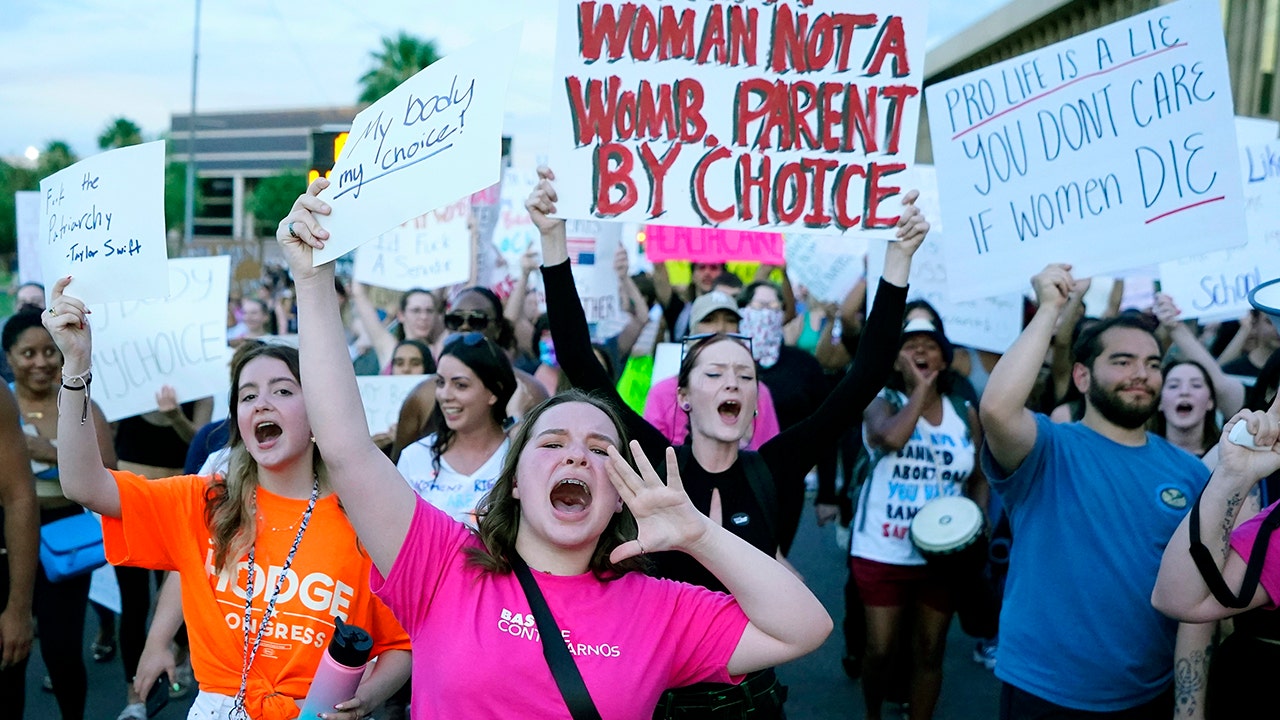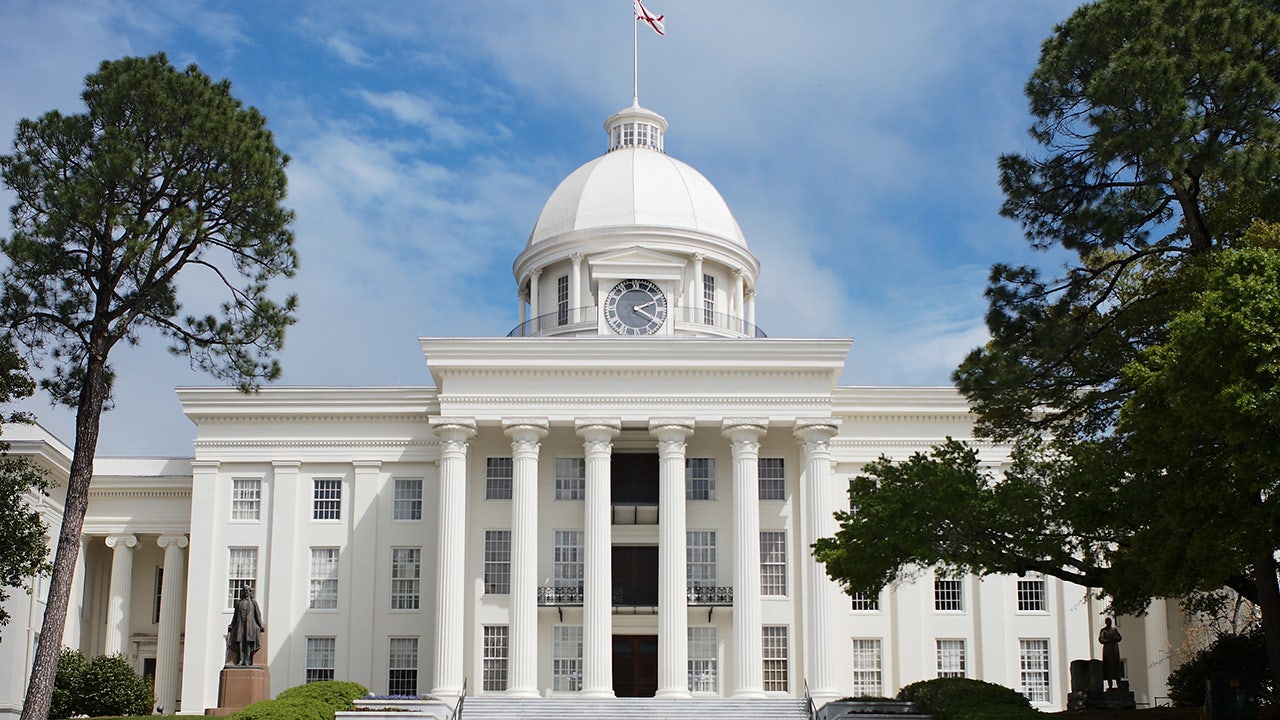Politics
Republican aims to break decades long Senate election losing streak in this blue state

EXCLUSIVE – It’s been over a half century since a Republican won a Senate election in blue state New Jersey.
But real estate developer and hotelier Curtis Bashaw is optimistic about his party’s prospects in November’s elections to end the decades-long losing streak.
Bashaw, one of the two leading contenders in a multi-candidate field in June’s GOP Senate primary in New Jersey, emphasized “I believe this is a once in a generation opportunity.”
“I can’t wait to see how we prove to the rest of the country that New Jersey is a lot more purple than people realize,” he added in a national digital exclusive interview with Fox News.
THIS POPULAR FORMER GOP GOVERNOR AIMS TO FLIP A SENATE SEAT IN HIS DEEP BLUE STATE
Real estate developer and hotelier Curtis Bashaw, a Republican candidate for Senate in New Jersey, stands in front of the historic Congress Hall hotel in Cape May, N.J., on April 10, 2024 (Curtis Bashaw campaign)
A major reason for Bashaw’s optimism is the prospect of a three-way race in New Jersey. Longtime Democratic Sen. Bob Menendez, who was indicted last year on federal corruption charges, is not running for re-election as a Democrat and instead is mulling an independent bid, which polls indicate would potentially take votes away from likely Democratic Senate nominee Rep. Andy Kim.
EMBATTLED DEMOCRATIC SENATOR MAY TESTIFY AGAINST HIS WIFE
Bashaw, an entrepreneur and historic preservationist who is recognized in the Garden State for leading the restorations of the historic Congress Hall and the Virginia Hotel in Cape May, at the southern tip of the Jersey shore, is a first time politician.
“I’m a political outsider,” Bashaw emphasized. “I’m a business guy. I built a business over 35 years restoring landmark abandoned hotels.”
And he highlighted that he grew his business from 25 to 1,000 employees.
“I’m in it because I want to unshackle small business from over regulation,” he said.

File photo of New Jersey Democrat Rep. Andy Kim, at the U.S. Capitol. (Fox News Digital/ Jon Michael Raasch)
Bashaw’s chief rival for the GOP nomination is Christine Serrano Glassner, who’s served for four years as mayor of Mendham Borough, in the northern part of the state.
Bashaw holds a formidable fundraising advantage in the Republican race – thanks in part to a large self-investment in his campaign.
He also enjoys an advantage on the primary ballot, as he has the county line in two-thirds of the state’s 21 counties.
SIX KEY SENATE SEATS REPUBLICANS AIM TO FLIP IN NOVEMBER
New Jersey has long allowed counties to print ballots that include a prominent party line, which are widely viewed as helping candidates with establishment backing. Kim sued in federal court to overturn the county lines in the Democratic Primary. But the GOP county lines were upheld.
“New Jersey is made up of thousands and thousands and thousands of small businesspeople. We are going to get to them really quickly and our name ID will go up really fast,” Bashaw said.
And pointing to a busy schedule on the campaign trail ahead of the primary, Bashaw showcased that “I go to six coffees a day. I go talk to every single county in our state. I put a lot of miles on the car.”

Former President Donald Trump greets attendees during a campaign event in Schnecksville, Pa., Saturday, April 13, 2024. (AP Photo/Joe Lamberti) (AP Photo/Joe Lamberti)
Asked about former President Donald Trump, who is the GOP’s presumptive presidential nominee, Bashaw told Fox News “I’m supporting this ticket top to bottom.”
It’s been 36 years since a Republican carried New Jersey in a White House race, but Trump is planning a campaign stop in the state next month.
“Donald Trump thinks New Jersey’s in play. I agree with him. Trump believes he can flip the country from blue to red. I believe we can flip this Senate seat from blue to red,” Bashaw said.
He argued that “there’s a massive opportunity to pull” New Jersey’s large pool of unaffiliated voters “to the Republican tent…. We are going to pull those unaffiliated voters our way this fall.”
National Republicans to date have not made any investments in the Senate race in the Garden State.
But National Republican Senatorial Committee communications director Mike Berg said “we’re keeping a close eye on New Jersey.”
A national Democratic Senate campaign aide, asked about the contest, told Fox News that “Democrats have won every New Jersey Senate race since 1978 and 2024 will be no different.”

Real estate developer and hotelier Curtis Bashaw, a Republican candidate for Senate in New Jersey, stands in front of the historic Congress Hall hotel in Ridgewood, N.J. on April 17, 2024 (Curtis Bashaw campaign)
Bashaw, in his interview, spotlighted a couple of key issues, including crime.
“New Jerseyans are not feeling safe and secure in their homes,” he argued.
On immigration and border security, another key issue Republicans are spotlighting, he charged that New Jersey “is now a border state. There are illegals coming into all of our counties.”
“The woke ideology has permeated through our culture and we now have in our state, schools keeping secrets from parents about very, very, personal decisions,” he claimed, as he defended parental rights in public education.
On the issue of abortion, which Democrats are spotlighting, Bashaw pointed to the two-year-old blockbuster decision by the Supreme Court’s conservative majority that overturned the landmark Roe v. Wade ruling, which for a half century had legalized abortion nationwide.
“I believe that the Dobbs decision was the correct decision,” Bashaw said.
But he added that “I don’t support a federal ban,” which some in his party are backing.
The Dobbs decision moved the fight over abortion back to the states, and in New Jersey abortion is legal in all stages of pregnancy.
“New Jersey’s decided it,” Bashaw said, before charging that “the Democrats are the extremists on this issue, passing legislation allowing abortions up until the day of birth.”
Get the latest updates from the 2024 campaign trail, exclusive interviews and more at our Fox News Digital election hub.

Politics
Which states could have abortion on the ballot in 2024?

- Since the U.S. Supreme Court overturned Roe v. Wade in 2022, most Republican-controlled states have implemented new abortion restrictions, and 14 ban it at every stage of pregnancy.
- Voters in 7 states have sided with abortion rights supporters on ballot measures.
- It is not yet clear how many states will vote in November on measures to preserve abortion access.
South Dakota advocates submitted petitions Wednesday in their effort to amend the state constitution to include the right to abortion, at least under some circumstances.
Signatures are also expected to be turned in Friday in Missouri for a ballot measure there.
The efforts in both states are part of a movement to put abortion rights questions to voters since the U.S. Supreme Court overturned Roe v. Wade and removed the nationwide right to abortion.
OUTSPOKEN PRO-ABORTION GOVERNOR GETS SPEAKING SLOT AT VATICAN SUMMIT
Since that 2022 decision, most Republican-controlled states have new abortion restrictions in effect, including 14 that ban it at every stage of pregnancy. Most Democrat-dominated states have laws or executive orders to protect access.
Additionally, voters in seven states — California, Kansas, Kentucky, Michigan, Montana, Ohio and Vermont — have sided with abortion rights supporters on ballot measures.
It’s not clear yet how many states will vote on measures to enshrine abortion access in November. In some, the question is whether amendment supporters can get enough valid signatures. In others, it’s up to the legislature. And there’s legal wrangling in the process in some states.
Some of the efforts have already failed to reach ballots. Wisconsin’s legislative session ended without a state Senate vote on a measure that the House approved to ask voters to ban abortion after 14 weeks. Iowa lawmakers did not approve a measure before their session ended this year to ask voters to find that there’s no constitutional right to abortion; Pennsylvania lawmakers previously pursued a similar amendment, but it’s not expected to be added to the ballot there this year. A Louisiana measure to enshrine abortion rights in the state constitution died in committee and one in Maine effectively died when it fell short of receiving the approval of two-thirds of the House.
Protesters shout as they join thousands marching around the Arizona Capitol after the Supreme Court decision to overturn the landmark Roe v. Wade abortion decision Friday, June 24, 2022, in Phoenix. (AP Photo/Ross D. Franklin)
WHAT’S SECURELY ON 2024 BALLOTS?
FLORIDA
The state Supreme Court ruled on April 1 that a ballot measure to legalize abortion until viability could go on the ballot despite a legal challenge from state Attorney General Ashley Moody, who argued that there are differing views on the meaning of “viability” and that some key terms in the proposed measure are not properly defined.
Advocates collected nearly a million signatures to put a state constitutional amendment to legalize abortion until viability on the ballot, surpassing the nearly 892,000 required.
Sixty percent of voters would have to agree for it to take effect.
Abortion is illegal in Florida after the first six weeks of pregnancy under a law that took effect May 1.
MARYLAND
Maryland voters this year will also be asked whether to enshrine the right for women to end their pregnancies in the state’s constitution in a ballot question put before them by lawmakers last year. The state already protects the right to abortion under state law and Democrats outnumber Republicans 2-1. Abortion is allowed in Maryland until viability.
NEW YORK
New York lawmakers agreed to ask voters to bar discrimination on the basis of pregnancy, pregnancy outcome and reproductive healthcare as part of a broader equal protection amendment. It would also bar discrimination on the basis of sex, sexual orientation, gender identity, national origin and disability. The language of the constitutional amendment does not mention abortion specifically. Abortion is allowed in New York law until viability.
WHERE ELSE COULD ABORTION BE ON THE BALLOT IN 2024?
ARIZONA
A signature drive is underway to add a constitutional right to abortion in Arizona. Under the measure, the state would not be able to ban abortion until the fetus is viable, with later abortions allowed to protect a woman’s physical or mental health. Supporters must gather nearly 384,000 valid signatures by July 4.
Abortion is currently legal for the first 15 weeks of pregnancy in Arizona. An Arizona Supreme Court ruling in April said enforcement could begin soon for a near-total ban that was already on the books. But on Thursday, the governor signed a bill repealing that law, which is still expected to be in effect for a time.
ARKANSAS
Proponents of an amendment to allow abortion in many cases have until July 5 to gather nearly 91,000 valid signatures to get it on the Nov. 5 ballot. The measure would bar laws banning abortion in the first 20 weeks of gestation and allow abortion later in pregnancy in cases of rape, incest, threats to the woman’s health or life, or if the fetus would be unlikely to survive birth. Because it allows limits as soon as 20 weeks, the proposal does not have the support of Planned Parenthood Great Plains, which includes Arkansas. The state has a ban on abortion at all stages of pregnancy with narrow exceptions.
COLORADO
Advocates for a ballot measure to add constitutional protections for abortion, including requiring Medicaid and private health insurers to cover it, have turned in signatures to have it placed on the ballot. The secretary of state’s office has until May 17 to determine whether there are enough valid signatures. More than 124,000 are required.
Amending the state constitution requires support of 55% of voters.
Those backing a dueling measure — a law to ban abortion — did not turn in signatures, and the measure will not go before voters.
Abortion is legal at all stages of pregnancy in Colorado.
MISSOURI
Missouri advocates for abortion access are expected to turn in signatures on Friday, two days ahead of their deadline to submit more than 171,000 to ask voters to approve a constitutional amendment to guarantee abortion until viability.
A group of moderate Republicans have abandoned for this year efforts for an alternate amendment that would have allowed abortion up to 12 weeks and after that with only limited exceptions.
Abortion is currently banned in Missouri at all stages of pregnancy with limited exceptions.
MONTANA
Abortion rights proponents in Montana have proposed a constitutional amendment that would bar the government from denying the right to abortion before viability or when it’s necessary to protect the life or health of the pregnant person. After a legal battle over the ballot language, the Montana Supreme Court on April 1 wrote its version of the language that would appear on the ballot if supporters gather more than 60,000 signatures by June 21. Abortion is legal until viability in Montana under a 1999 Montana Supreme Court opinion.
NEBRASKA
Advocates are trying to collect about 125,000 signatures needed by July 5 to put a constitutional amendment before voters to protect abortion rights until fetal viability. A competing petition effort would add a constitutional amendment that mirrors a law adopted last year that bans abortion after 12 weeks, with some exceptions.
NEVADA
Signatures are being gathered to place an abortion access amendment on Nevada’s ballot in November. Under the amendment, abortion access for the first 24 weeks of pregnancy or later to protect the health of the pregnant person, which is already assured under a 1990 law, would be enshrined in the constitution. It requires more than 102,000 valid signatures by June 26 to place the measure on the ballot. Voters would need to approve it in both 2024 and 2026 to change the constitution.
The measure is one of several attempts by Nevada abortion rights groups to get a ballot question before voters in 2024 or 2026.
SOUTH DAKOTA
South Dakota advocates said they submitted more than 55,000 signatures — 20,000 more than required — to get a measure on the ballot that would loosen restrictions but does not go as far as many abortion rights advocates would like. It would ban any restrictions on abortion in the first trimester of pregnancy. It would allow the state in the second trimester to “regulate the pregnant woman’s abortion decision and its effectuation only in ways that are reasonably related to the physical health of the pregnant woman.” An abortion ban would be allowed in the third trimester, as long as it included exceptions for the life and health of the woman. Planned Parenthood is not supporting the measure.
Abortion in the state is now banned at all stages of pregnancy with narrow exceptions.
Politics
Gazans thank U.S. campus protesters. Israel condemns what it sees as 'Nazi-like behavior'

People across the Gaza Strip sent messages of appreciation to demonstrators on U.S. campuses, thanking them for their protests against the Israel-Hamas war.
Children, parents and medical staff assembled in the courtyard before Al Aqsa Martyrs Hospital in central Gaza on Wednesday, with many of them unfurling banners carrying university insignia with “Thank you for supporting our cause.”
Others brandished signs that said, “Your voices pierce the wall of silence and reach the victims in Gaza,” “The killing of children in Gaza must stop” and “Palestine is everywhere.”
In recent days, as protests and encampments have spread on dozens of U.S. campuses, people in Gaza have taken note of the outpouring of solidarity, both in the United States and abroad.
They in turn have responded — on social media, in rallies, in videos, by words scribbled on tents — with messages of support of their own. Many view the protests as a positive omen in a time of unrelenting bleakness in Gaza.
At another event, in Deir al Balah, others hoped for similar protests to spread in European and Arab countries.
“This was a gathering of thanks and pride for the efforts by students in American universities,” said Baraa Safi, an English teacher interviewed by a local broadcaster on Wednesday.
“It makes a big difference in our lives and it gives us hope that people are still hearing us; that people want to help us, stand with us and end the war we’re living through every day.”
Universities across the U.S. have been rocked since mid-April by demonstrations demanding universities’ endowments divest from Israel-linked investments and companies and calling on Israel to end its bombardment and ground attacks in the Palestinian territory.
Israel’s war on the Hamas militant group has lasted nearly seven months and has killed more than 34,000 people and wounded more than 77,000, according to Hamas health authorities in Gaza. The figures do not distinguish between civilians and combatants, but officials, aid groups and activists say most of the casualties are women and children.
Israel launched its military offensive in Gaza Strip after the Oct. 7 attack, when Hamas operatives stormed more than 20 sites in southern Israel, killing roughly 1,200 people and taking about 250 hostage. Slightly more than half of the hostages are believed to remain in Gaza, including 34 that are presumed dead by Israeli authorities.
Israel’s ambassador to the United Nations characterized the U.S. campus protests as “the murderous cries of the pro-Palestinian mobs” and castigated universities for allowing “Nazi-like behavior.”
“We always knew that Hamas hides in schools,” Gilad Erdan said in a speech to the U.N.’s General Assembly on Wednesday. “We just didn’t realize that it’s not only schools in Gaza. It’s also Harvard, Columbia and many elite universities.”
He also accused the U.N. of spreading “anti-Israel vitriol” and said the organization’s “days were numbered.”
The protests in the U.S. have added to domestic and international pressure on President Biden to push through a deal between Hamas and Israel that would end the fighting and release hostages and other detainees.
On Wednesday, Secretary of State Antony J. Blinken said “there is a proposal on the table” and “the time is now” for a deal. He blamed Hamas for the delay, a charge the group’s leaders denied.
On Thursday, Hamas said its negotiating team would return to Egypt soon for additional talks and a response to a proposal made this week.
The group’s chief, Ismail Haniyeh, said in a call Thursday to Qatari Emir Sheikh Tamim bin Hamad Al Thani that Hamas was studying the cease-fire proposal with a “positive spirit.”
Negotiations have stumbled over the permanence of a cease-fire and whether the displaced will be able to return to their homes in Gaza. Mediators have offered a 40-day cease-fire and exchange of Israeli hostages and many Palestinian detainees.
Politics
Alabama lawmakers advance bill letting inmates speak at parole hearings

A legislative committee on Thursday advanced a bill to allow state inmates, for the first time, to speak by phone or video conference at their parole hearings.
The House Judiciary Committee approved the bill after adding an amendment to give victims and law enforcement officials the option to also participate by electronic means instead of driving to Montgomery for the parole hearing.
The bill, which was approved in the Senate without a dissenting vote, now moves to the Alabama House of Representatives to be considered in the final three days of the legislative session.
ALABAMA LAWMAKERS EYE GAMBLING COMPROMISE AS LEGISLATIVE SESSION NEARS ITS END
Alabama is one of two states that do not allow inmates to speak at parole hearings.
“SB 312 gives the incarcerated inmate the ability to participate in the hearing and more importantly, it gives the Parole Board another opportunity or an opportunity to question that inmate,” Republican Sen. Will Barfoot, the bill sponsor, said.
Exterior view of the Alabama State Capitol on March 22, 2020 in Montgomery, Alabama. (Taylor Hill/Getty Images)
The approval came after earlier disagreements over a proposal that would have weakened the bill by letting the Parole Board decide whether inmates could participate.
Wanda Miller, executive director of VOCAL, a victims advocacy group, said her organization opposes the bill because it believes the current system is adequate. Miller said victim advocacy groups had suggested the amendment to allow victims and law enforcement officials to also speak by phone or video conference.
Barfoot said that will make it easier for victims and law enforcement officials to participate in hearings instead of “driving sometimes three hours to sit through a 10- or 15-minute hearing.”
If approved, the measure would become effective on Oct. 1.
-

 News1 week ago
News1 week agoLarry Webb’s deathbed confession solves 2000 cold case murder of Susan and Natasha Carter, 10, whose remains were found hours after he died
-

 World1 week ago
World1 week agoHaiti Prime Minister Ariel Henry resigns, transitional council takes power
-

 News1 week ago
News1 week agoFirst cargo ship passes through new channel since Baltimore bridge collapse
-

 World1 week ago
World1 week agoUS secretly sent long-range ATACMS weapons to Ukraine
-

 World1 week ago
World1 week agoSpanish PM Pedro Sanchez suspends public duties to 'reflect'
-

 News1 week ago
News1 week agoAmerican Airlines passenger alleges discrimination over use of first-class restroom
-

 Movie Reviews1 week ago
Movie Reviews1 week agoHumane (2024) – Movie Review
-

 Education1 week ago
Education1 week agoVideo: Johnson Condemns Pro-Palestinian Protests at Columbia University
















